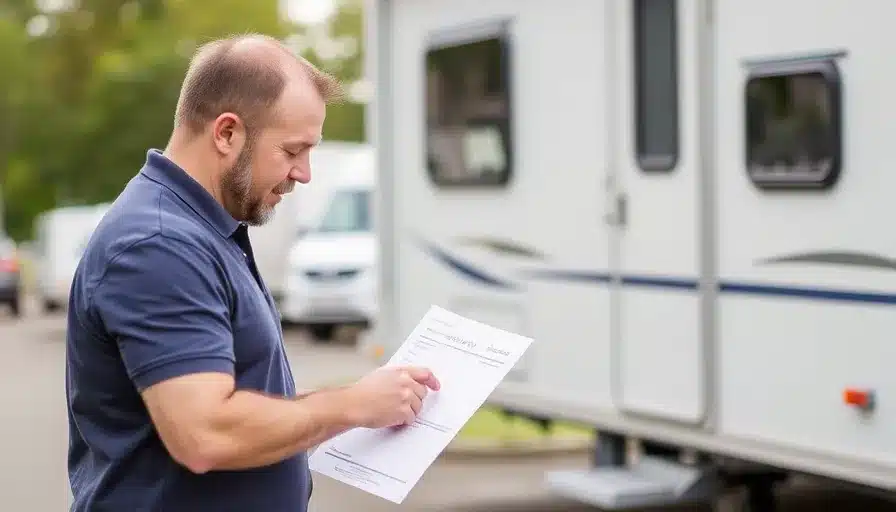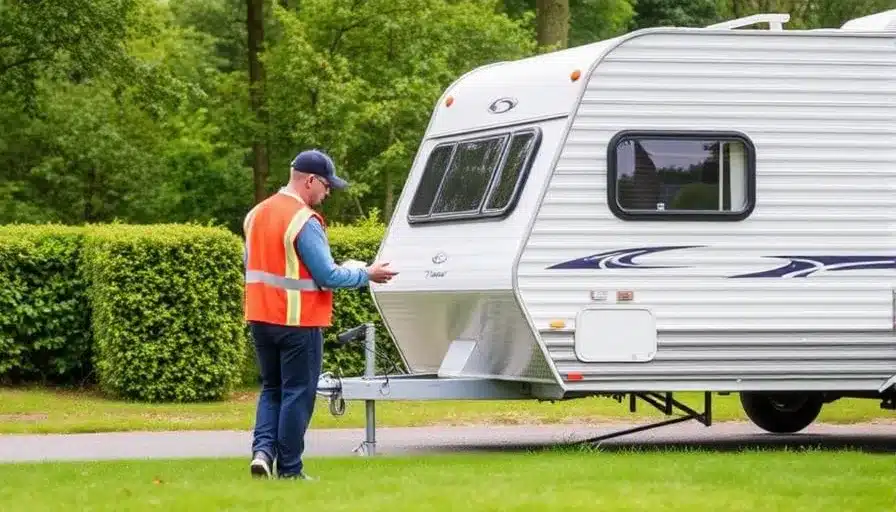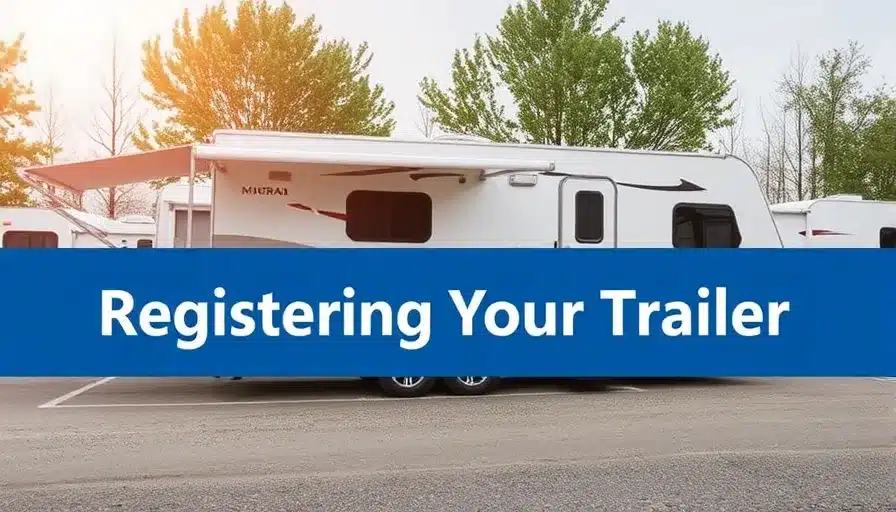The title document for a trailer serves as proof of ownership. When you purchase a trailer, you receive a title document that lists you as the legal owner. It includes essential details such as the vehicle identification number (VIN), your name, and sometimes lienholder information. Having a title is crucial because it establishes your right to the trailer. If you ever sell or transfer ownership, you must sign the title to the new owner.
Not everyone can buy a new trailer from a reputable dealership. If you have a trailer with no title, you’ll need to get a title before using it on any public road. Several steps must be covered to get a title and have the trailer ready for the road.
In the USA, a trailer is an unpowered vehicle towed by a powered vehicle. This definition covers all unpowered vehicles, from the smallest box trailer for carrying luggage to camping and recreational trailers and up to the largest multi-axle freight trailer.
People tend to confuse these two entities, but they are very different. Before proceeding, let’s examine the two documents and their purposes.
A title, also known as a “pink slip,” is a legal document issued by the Department of Motor Vehicles certifying you as the vehicle’s owner. It is essential when operating any vehicle on the road because it provides legal proof of ownership.
On the other hand, registration is a separate process related to your state of residence. By registering your vehicle, you demonstrate that you’ve paid the necessary taxes and fees required by the state. You’ll typically receive a state-issued license plate or a registration sticker as proof of registration. These identifiers indicate that your vehicle is known to the state, is roadworthy, and that you’ve fulfilled all ownership-related obligations.
In many jurisdictions, state laws typically allow a 30-day window from the purchase date to title and register your trailer. However, it’s essential to recognize that this serves as a guideline rather than an absolute rule, as state regulations can differ significantly.
Keep in mind that not all states require titles and registrations for trailers. Nevertheless, failing to title and register a trailer in a state where it’s mandatory can lead to penalties, which become more severe the longer the trailer remains untitled. Stay informed about your specific state’s requirements to avoid any issues.

If you have purchased a trailer and the owner has given you a bill of sale and the original title document, it’s straightforward to transfer the title to your name and complete all the necessary registrations.
First, gather the documentation you will need together. Take the current Indiana BMV title certificate for the trailer, the bill of sale or purchase agreement related to the trailer, and the Indiana application for Trailer Registration.
Schedule a VIN inspection and bring all the relevant documentation to the appointment. The VIN inspection will verify that the trailer’s identity is correct and meets all the legal requirements. After completing the VIN inspection, pay all the taxes and fees and receive your new registration documentation. The title will be mailed to you within 21 calendar days.
If you have a trailer without a title, the first thing to do is check the trailer for a VIN and an identification plate. If the trailer has a VIN, the new owner can apply to the DMV for a duplicate title, but if the VIN is missing, damaged, or illegible, the first step is to apply for a VIN.
The Vehicle Identification Number (VIN) is a 17-digit code that uniquely identifies motor vehicles. Manufacturers calculate the VIN using a specific mathematical formula provided by the Society of Automotive Engineers (SAE). This alphanumeric sequence contains essential information about the vehicle’s make, model year, country of origin, and other relevant details.
Yes, you’ll need a Vehicle Identification Number (VIN) before obtaining a trailer title. The VIN is crucial for registration and legal purposes, as it serves as a unique identifier for the vehicle.
If your trailer doesn’t have a VIN yet, you’ll typically need to obtain one through a VIN assignment process. Check with your local Department of Motor Vehicles (DMV) for specific requirements in your state.
While each state may have specific steps, you’ll generally need a completed Law Enforcement Identification Number Inspection (Form VTR-68-A) from an authorized inspector. For manufactured vehicles, the form must include the vehicle’s year and be identified by the inspector. The inspector must indicate that the trailer was assembled from parts for assembled or homemade trailers. Sufficient ownership evidence is crucial, which may include the title, bill of sale, or a bonded title application. If ownership evidence is unavailable, a court order declaring ownership can serve as acceptable evidence.
Once a VIN has been issued, it must be etched or stamped onto the trailer’s chassis, or a trailer serial plate with the VIN must be welded, riveted or securely bolted to the trailer’s chassis.

When constructing a homemade trailer, obtaining a Vehicle Identification Number (VIN) is essential for registration and legal use on public roads. This is the process for Indiana, but other states may have slightly different requirements, so check with your state before starting your build. Here’s how you can get a VIN for your homebuilt trailer in Indiana:
Meticulous documentation is essential when obtaining a title for your trailer. Keep records of all components used in building the trailer. Save purchase receipts for materials such as the frame, axle, wheels, lights, and other significant parts.
Take photographs and make sure you capture images before, during, and after construction. These photos provide visual evidence of your trailer’s components and construction process.
If you purchased the trailer from someone else, obtain a bill of sale. If this was from a commercial enterprise, secure the Manufacturer’s Certificate of Origin (MCO), which validates the trailer’s origin and authenticity.
Knowing the weight of your trailer is crucial for the inspection and subsequent registration. You can weigh your trailer at a public scale or a designated weigh station.
Obtain the Indiana Vehicle Registration Application form and complete it by providing essential details about your trailer, including its make, model, and VIN. Ensure you include your personal information and any co-owners, if applicable.
Complete the Indiana Certified VIN Inspection form and take all the paperwork required for the inspection when you attend.
Gather receipts for significant trailer components used during construction. These will include a document for purchasing the trailer frame or proof of purchase of the metal components used in the frame’s construction (including as many photographs as possible). Keep the receipt for the axle, wheels, lights and couplers.
Contact your local law enforcement agency or a certified VIN inspector and schedule an appointment for the inspection. The VIN inspection serves two critical purposes: it confirms the trailer’s identity and ensures that it meets the state’s legal requirements.
During the inspection, the inspector will examine all significant parts of the trailer, checking components such as lights, brakes, safety chains, couplers, tires, and VIN plates.
Bring your trailer, completed forms, construction documentation, and photo ID to the inspection. The inspector will meticulously assess various aspects during the trailer inspection to ensure safety and compliance.
The inspector will conduct a series of checks to ensure the trailer meets all the regulatory requirements. The lights inspection includes verifying the brake lights illuminate when you apply the brakes, the turn signals function correctly, the tail lights are operational, and the license plate is well-lit. Reflectors will be checked to ensure visibility during low-light conditions.
Electric or surge trailer brakes will be checked to verify their functionality, and the inspector will check that two safety chains are securely attached to prevent the trailer from separating in case of hitch failure. The coupler attaches the trailer to the towing vehicle and will be inspected to ensure it is in good condition and properly secured.
The tires will be inspected for wear, damage, or uneven tread, and the tire fenders, which prevent mud, debris, and road spray from affecting other vehicles, will be inspected to ensure they fulfill their function.
Specific requirements may vary, so consult the Indiana BMV for precise guidelines.
If you’ve lost the receipts for your trailer components, don’t worry—there are still steps you can take to proceed with the VIN assignment process in Indiana:
Again, different states may have different requirements, so check with your local DMV before starting this process. The DMV will work with you to find a solution.

Once you’ve established ownership of the trailer and have the title document, register it with the state authorities to get a registration number. In Indiana, the process to register a trailer involves the following steps:
Remember to check specific requirements and deadlines for the state where you reside and provide necessary proof of address during transactions.
Obtaining a title for your trailer is crucial in ensuring legal compliance and ownership. It is evident that there are clear guidelines for getting a title for a homebuilt trailer, but it involves a considerable amount of administrative work. Working with Millennium Trailers, you can be assured of a quality trailer designed to your specifications and with all the necessary documentation to use your trailer from day one. Millennium Trailers also remind you that carrying your registration papers is imperative, as traffic authorities request them.
Mike Gilmour (Unknown) , RV and Playa, [blog], How to Get a Title for a Trailer Without Title (Explained), How to Get a Title for a Trailer Without Title (Explained) (rvandplaya.com), (28/06/2024)
Laura Longero (Apr 17, 2023). CarInsurance.Com [blog], What is the difference between title and registration?, What is the difference between title and registration? (carinsurance.com), (28/6/2024)
Unknown. VINVaquero [blog], How to Get a VIN Number for a Homemade Trailer, How to Get a VIN Number for a Homemade Trailer – VinVaquero.com, (28/6/2024)
Mark Janke (Unknown). Overland Trailer [blog], How to Register Your DIY Teardrop Trailer in Indiana, How to Register Your DIY Teardrop Trailer in Indiana – Overland Teardrop Trailer (overlandtrailer.com), (28/6/2024)
Kathy Teel (July 7, 2012), The DMV Made Simple [website], When Do You Need to Title and Register Your Trailer?, When Do You Need to Title and Register Your Trailer? | DMV.ORG, (28/6/2024).
Millennium Trailers is your trusted partner for high-quality trailers at unbeatable prices. Serving all 50 states, we’ve delivered over 5,000 trailers nationwide.
Established in 1998, we’re a company dedicated to meeting your hauling needs with excellence. Whether it’s cargo trailers or custom living quarters, we provide a wide range of options to suit your requirements. Our knowledgeable and friendly team ensures a smooth buying experience with personalized assistance. Proudly offering competitive pricing, state-of-the-art designs, and easy financing options. Committed to customer satisfaction, we strive to simplify the process of finding your perfect trailer.
Choose Millennium Trailers for a reliable, customized solution that delivers quality and value for your investment.
Copyright 1998 – 2023 Millennium Trailers, Inc.